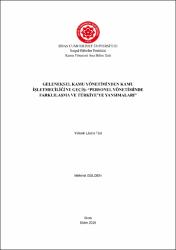| dc.contributor.advisor | Kılavuz, Raci | |
| dc.contributor.author | Gülden, Mehmet | |
| dc.date.accessioned | 2022-02-17T07:24:23Z | |
| dc.date.available | 2022-02-17T07:24:23Z | |
| dc.date.issued | 2019 | tr |
| dc.date.submitted | 2019-09-13 | |
| dc.identifier.other | xi, 123 | |
| dc.identifier.uri | https://hdl.handle.net/20.500.12418/12451 | |
| dc.description.abstract | Kamu yönetimi disiplininde “yönetim-işletmecilik” ayrışması çok eski
tarihlerden itibaren üzerinde durulan konulardan biri olmuştur. Küreselleşmenin ivme
kazanması, teknolojinin hızla gelişmesi ve yönetimlere yönelik toplumsal
beklentilerin değişmesi kamu kurumlarının özel sektör kurumları ile rekabet
edebilecek düzeyde kendini yenilemesi ve oluşan beklentilere mümkün olan en kısa
sürede cevap verebilecek hıza ve esnekliğe kavuşmasını zorunlu hale getirmiştir. Bu
bağlamda karşıt görüşler olsa da geleneksel kamu yönetimi anlayışı yerini yeni kamu
yönetimi anlayışına bırakmaya başladığı iddia edilebilir.
Yeni yönetim anlayışı geleneksel yönetim anlayışını kamu hizmetlerinde
sonuçlardan çok hizmeti oluşturan süreçlerin takip edilmesinden dolayı verimsiz ve
hantal bir yapı olarak görmekte, geleneksel yönetim anlayışını rekabete,
özelleştirmeye, yerelleşmeye, performansa, müşteriye, piyasaya, maliyete odaklı
oluşturulan yönetim şemaları ile hesap verilebilirliğin ve verimliliğin ön planda
olduğu küçük ama etkin bir yönetim modeline dönüştürmeye çalıştırdığı
söylenebilir.
Yeni kamu işletmeciliği anlayışında personel yönetimi nitelikli personel
seçimi, uygun personelin yetiştirilmesi, ücret politikaları, performans gibi bir çok
konuda geleneksel yönetim anlayışından ayrılmaktadır. Yeni kamu işletmeciliği
anlayışının geleneksel personel yönetimi üzerine etkilerini görebilmek için; yeni
yönetim yaklaşımının personel yönetiminde işe yönelik kadro uygulamalarını, sistem
dışı istihdama açık kariyer uygulamalarını, performansa bağlı değerlendirme
sürecinin yansımaları ve ücretlendirme politikalarını iyi bilmek ve doğru analiz
etmek gerekmektedir.
Bu çalışmanın amacı, yeni işletme esaslarına dayalı yönetim sürecinin daha
çok özel sektörde uygulanan personele yönelik performansa dayalı esnek istihdam ve
yönetim politikalarının geleneksel kamu personel yönetim sistemi üzerindeki
yansımalarını incelemektir. Ayrıca Türk kamu personel sisteminin yeni yönetimin
anlayışında hangi konularda ne denli etkilendiği, uygulamalar ve yasal mevzuatlar
çerçevesinde ortaya konmaya çalışılmıştır. | tr |
| dc.description.abstract | In the discipline of public administration, the distinction of '' managementbusiness
'' is one of the debated issues for a long time. The rapid globalization of the
world, the rapid change in technology as well as the change in social expectations
against governance have made it compulsory for public institutions to renew
themselves in a way to compete with the private sector and to achieve the speed and
flexibility that can meet the expectations as quickly as possible.Despite of the
different opinions from this point of view, it can be argued that the contemporary
understanding of public administration has begun to replace the traditional one.
The new public management approach considers the traditional one as an
inefficient and cumbersome structure due to the monitoring of the processes creating
service rather than the results. The new public management the schemes that are
focused on competition, privatization, localization, performance, customer, market,
cost and accountability are in the foreground. small but effective management model.
In the new public management approach, personnel management differs from
traditional one in many subjects such as selection of qualified personnel, training of
appropriate personnel, wage policies and performance. In order to see the effects of
the new public management approach on traditional personnel management; it is a
necessity to understand and correctly analyze the personnel management practices of
the new management approach in personnel management, career practices open to
non-system employment, the reflections of the performance-based evaluation process
and the remuneration policies.
The main purpose of this study is to examine the reflections of the new
management principles rely on the performance of flexible employment and
management policies on traditional public personnel management system. In
addition, the extent to which the Turkish public personnel system is affected in the
understanding of the new management has been tried to be put forward within the
framework of practices and legal regulations. | tr |
| dc.language.iso | tur | tr |
| dc.publisher | Sivas Cumhuriyet Üniversitesi-Sosyal Bilimler Enstitüsü | tr |
| dc.rights | info:eu-repo/semantics/openAccess | tr |
| dc.subject | Kamu Yönetimi | tr |
| dc.subject | Kamu İşletmeciliği | tr |
| dc.subject | Personel Yönetimi | tr |
| dc.title | Geleneksel Kamu Yönetiminden Kamu İşletmeciliğine Geçiş:“Personel Yönetiminde Farklılaşma Ve Türkiye Yansımaları” | tr |
| dc.type | masterThesis | tr |
| dc.contributor.department | Sosyal Bilimler Enstitüsü | tr |
| dc.relation.publicationcategory | Tez | tr |















